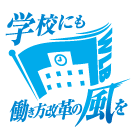- Home
- 2018 TALIS Results (VolumⅠ) launched ~Japanese teachers still work longest~
ABOUT JTU
2018 TALIS Results (VolumⅠ) launched ~Japanese teachers still work longest~
2019/06/23
 "Work Style Reform in Schools" campaign logo
"Work Style Reform in Schools" campaign logo
OECD launched 2018 TALIS Results (VolumⅠ) which 48 countries and economies joined.
Education International (EI) stated “it will be difficult to receive a full picture of the implications of the TALIS findings until the second volume of TALIS makes the full correlations between all the outcomes of the Survey.” and points out the common issues on the teaching profession which TALIS 2018 showed; “the amount of time teachers spend on teaching in the classroom has declined because of administrative burdens and keeping order.” and “beginning or novice teachers receive insufficient induction in their first years of teaching”.
According to the country report, the outlines on Japan are;
【Findings on pricipals, teachers and students】
・Teachers are, on average, 42 years old, and 33% of teachers are aged 50 and above. This means that Japan will have to renew one out of three members of its teaching workforce over the next decade or so.
・ Only 7% of principals are women, compared to 42% of teachers. This can be benchmarked against the OECD averages of 47% of women among school leaders and 68% among teachers.
【Teachers’ working hours】
・Teachers of elementary schools work 54.4 hours per week and those of junior high schools 56.0 hours per week, which are longest among the participating countries and economies.
・Teachers of elementary schools spend 0.7 hours for professional development and those os junior high schools 0.6 hours, which is the shortest among the participating countries and economies.
Japan Teachers’ Union analyzes the findings in the view of “Work Style Reform Campaign.”
・In Japan, Teachers are swamped with administrative works and meetings and do not have enough time while students stay at schools. This means that teachers are afflicted with how they manage to communicate with children who have difficulties.
・The teachers who have club activities after shools work too much and too long hours. All the stakeholders need to cope with the burden according to guidline issued by Japan Sports Agency.
・It is infered that the teachers are forced to focus on standardized tests and they have no time and no headspace to improve teaching due to congested national curriculum. This means that it is required for educational authorities to amend comprehensively and holistically educational policies.
・There is nationally lack of teachers and the competition rate of teacher employment examination is lower, and therefore sustainablity of public education can be said to be in crisis.
The fidings show the reality of schools in Japan. The whole fidings of TALIS 2018 will be launched in March 2020.
Japan Teachers’ Union urges “Work Stle Reform Campaign” and participates in the social dialogue as representative of educators so that quality education for all be ensured.


